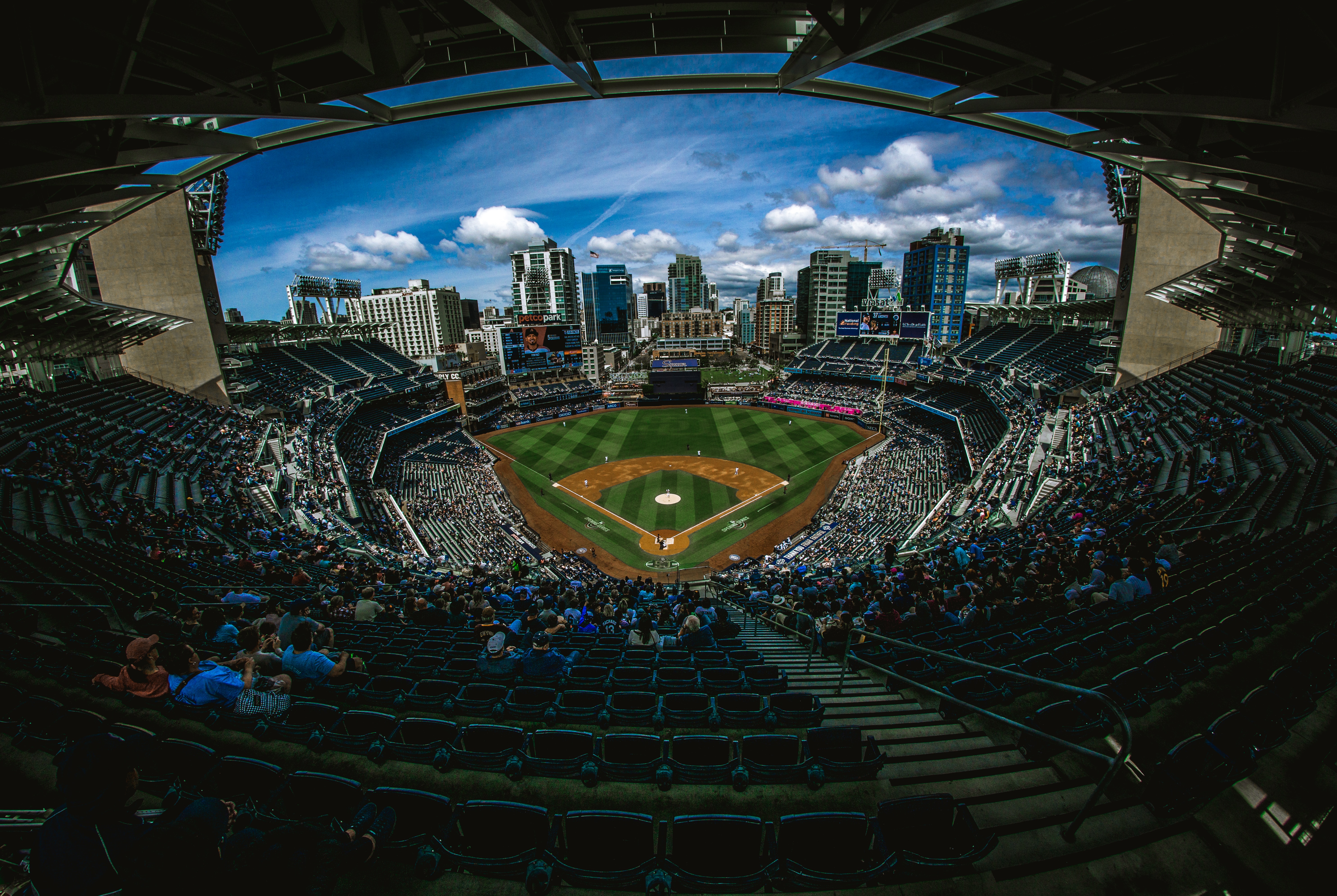
Prompt Images
Josh and Dennis both love baseball. But that is where their shared baseball opinions end. They root for different teams, disagree about the designated hitter, and really clash about whether the game needs to be sped up, to make it more watchable for the masses. Below, they try to hash out the best solutions and see if they can come up with any common ground, one paragraph at a time.
JOSH: Dennis, I really love baseball. Red Sox games are on in our house most nights, but the games feel interminably long. When I go to games, I root for my team first, and speed just behind that. The average length of a game in 2019 is 3 hours and 4 minutes. That’s a Quentin Tarantino movie and, which are—not so coincidentally—about 30 minutes too long. You must want games to come in under 3 hours, no?
DENNIS: In recent years, I have begun to take a much more middle-aged dad approach to my baseball viewing in that I now will put any dang game on. At least for as long as my wife will tolerate a Reds-Padres matchup. I still lean heavily on on my faves, the Nats and Royals, but lately I’ve been tuning in to check on specific players. (Right now, I have Zack Greinke’s Astro’s debut on.)I don’t want games to feel interminable, but you have to go back to 1985 to find a season when games averaged less than 2 hours and 45 minutes, and back to 1978 to find one with games averaging less than 2 and a half hours. This isn’t a recent phenomenon. And more importantly, I don’t trust MLB to find ways to shorten games that aren’t horrible.
JOSH: So baseball has always been long and it’s that our attention spans are getting shorter?
https://gph.is/2IGichv
I don’t think I want extreme measures taken to shorten the game, but I think there are some easy actions that could shave total run time, and more importantly, make the game more exciting. For example, the time lost for batters and pitchers stepping off and readjusting is a total waste. It’s hard to tell how much time that would save (I would guess tens of minutes), but it would keep the game moving. In terms of what baseball has done or is planning on doing, I like the suggestion of pitchers facing a three batter minimum, and don’t care much about the pitch clock.
DENNIS: I agree completely with the three batter minimum and keeping batters from stepping out after every pitch. See? Look at all of this agreement! By the way, I just watched Daniel Murphy take a pitch and then step out of the box to redo the straps on both of his batting gloves. How loose could they have gotten from performing his lazy pre-pitch bat waggle and then holding the bat for 5 seconds?
We need some sort of reverse balk for when batters waste time with their little tics. Even if you could save only 10 seconds per at bat by keeping batters in the box (a number I think is very conservative), that would save 9 minutes at MINIMUM. But MLB is content to take their precious seconds of game time in a piecemeal fashion that are largely worthless.
Eliminating the intentional walk saves 40 seconds because of how infrequently batters are intentionally walked. That’s the kind of idea making it out of the MLB Think Tank.
If time is such a concern, wouldn’t the best, most obvious answer be to shorten games? Make them eight innings instead of nine? I also agree with you that excitement (or perceived excitement) is the real issue. Baseball games last about as long as football, and Americans watch any garbage football game that airs on TV. So is this where we discuss the DH, because MLB’s best idea is that offense equals excitement?
JOSH: We can talk about the DH. I like it because good hitters are better than bad hitters. I don’t like double switches, because baseball doesn’t have to be over-thought. But I would rather keep finding ways to shed baseball of its excess.
I don’t know if we need as many extra innings as the game currently offers, which technically, is bottomless. What about three innings and then we agree to a tie? There are 162 games, do they all have to be wins or losses? If both teams know they get 12 innings max, that makes those last few innings way more exciting. Extra innings now is a schlepp.
DENNIS: This is where I reveal my weird DH opinion. I like that one league has the DH and one doesn’t. It gives purpose to the NL and AL beyond playoff brackets. Think of football. What is the difference between the AFC and NFC? There isn’t one. And if there isn’t one, then why not do what the NBA does and split them geographically for travel purposes?
The DH, while also being a hint at baseball’s history of regionalism, gives logic to having two leagues spanning the country. I like that AL games have a roster spot for one more slugger, and I like that NL games force pitchers to hit and managers to make tough decisions. I like Big Papi having a longer career, AND I like Bartolo Colón hitting a home run.
But if we want to speed up games, shouldn’t we abolish the DH? Make all pitchers hit and get their outs faster. I know I’m in the minority in that I think of baseball’s length to be a feature, not a bug. It’s fun that sometimes a game goes 12+ innings and an outfielder might have to pitch.
Baseball-watching is an activity built around drinking outside and staring at a lawn. Are we really in a time crunch to do that? I think adding ties would have the opposite effect of drawing viewers. Americans hate ties. We complain when football games end in a tie and it’s still part of what baffles us about soccer.
JOSH: Do you think people would stop going to games because of the rare chance of a tie? Being at games that go to extras is awful! I know, I know, FREE BASEBALL! But also, you could be there forever. It’s like when the bus isn’t showing up to the stop and you KNOW as soon as you leave and give up on it, that the fucking bus will come. That’s what it’s like being at a game with extra innings.
But if you wont give up extra innings, what about this radical idea: Cut down on checking the runner at first base. Here’s how it works: If a pitcher throws to first because the runner’s lead is too big, and the runner doesn’t slide back into the base, it’s ball one. If he slides back safely, there is no effect on the count to the batter. That way the pitcher is less likely to throw to first unless the runner is really taking a big lead. Meanwhile for the runner, he can try to not slide back in, but risk being tagged out. Plus its another competitive and exciting wrinkle. WHO SAYS NO?
DENNIS: I do not say no. I support that idea, even though I think that will be similar to the intentional walk, in that its impact will be minimal. I’m in favor of adding more idiosyncrasies to baseball. And that would be another way that players could add value: tricking pitchers into throwing over.
What if, instead of ending games in a tie at the 12th inning, the bar for scoring was lowered? In the 13th inning, getting to third base counts as a run, in the 14th getting to second is a run, and from the 15th on getting to first is a run. Games could still go on indefinitely, but only because teams were matching each other run for run and not ineptitude.
But let’s get back to the simplest solution: reducing the number of innings. We don’t want more Ump Shows or Joe West explaining how he interprets the Cup Adjustment rule. Some purists will complain that playing fewer innings ruins the integrity of the records. Baseball records aren’t as sacred as a lot of people purport. That ship sailed multiple times with juiced balls, juiced players, and segregation. Fewer innings. It’s simple. It doesn’t require an Atlantic League incubation period. It will cut down on bullpen strain.
JOSH: Those are some fun ideas that would indeed drive baseball purists crazy… so mark me down for a bunch of yeses. I was watching the Mets beat the Nats last week, and Harold Reynolds suggested that in extra innings teams should get only two outfielders. Another fun, bizzare solution! Huzzah!
I wonder if the league presented the players with this kind of pu-pu platter of game-shortening ideas, or told them, “No one leaves the batter’s box, no mound meetings, no delays, get your shit together, quick!,” which the players would choose. Any of these changes would help the game evolve, not hurt the league’s legacy. Oh and by the way, 162 games is ridiculous. Every team should play six games a week, for 25 weeks (April until mid-September), for a total of 150 games. This isn’t rocket science or even tip calculator math, it’s just obvious. Anything we missed?
DENNIS: We could really insult their manhoods (menhood?) and institute a Slaughter Rule. If a team is winning by 10 or more runs at any point after six innings, just call the game. This would add some drama to blowouts as we wonder if a team getting curb stomped can keep pace and extend the game. As best I can tell, this rule would have eliminated three amazing comebacks since 1925. I think we could all live with that if it means getting home a little earlier. Whaddaya think?
JOSH: I thought this was supposed to be an argument. Meanwhile, we’re sitting here rubberstamping each other’s ideas, like we don’t work in Congress. I love that because position players pitching is not fun. It’s not funny. It’s rarely interesting. Teams should not have to waste bullpen arms (or any arms) if they want to fold. Poker does it, and look how popular that… used to be. Bad example.
I am sure fans would be disappointed to not get a full game but would they really want to sit around for a joke of a game? Thanks for all the good idea, I’ll go ahead and forward them to Prompt Corporate who can shoot them over to the MLB Think Tank. Next year we should meet up for beers and a two-hour baseball game!



